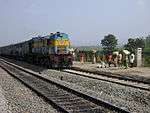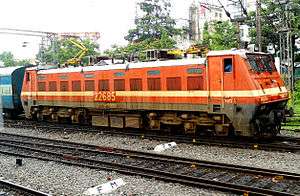Indian locomotive class WDM-2
Indian locomotive class WDM-2
 |
| Type and origin |
|---|
| Power type |
Diesel |
|---|
| Builder |
Alco, DLW |
|---|
| Model |
DL560C |
|---|
| Build date |
1962 onwards |
|---|
| Total produced |
2700+ |
|---|
|
| Specifications |
|---|
| UIC class |
Co-Co, Co'Co' |
|---|
| Gauge |
1,676 mm (5 ft 6 in) |
|---|
| Bogies |
ALCO Asymmetric cast frame trimount |
|---|
| Wheel diameter |
1,092 mm (3 ft 7 in) |
|---|
| Wheelbase |
12.834 m (42 ft 1 1⁄4 in) |
|---|
| Length |
17.12 m (56 ft 2 in) |
|---|
| Width |
2.864 m (9 ft 4 3⁄4 in) |
|---|
| Height |
4.185 m (13 ft 8 3⁄4 in) |
|---|
| Axle load |
18,800 kg (41,400 lb) |
|---|
| Loco weight |
112,800 kg (248,700 lb) |
|---|
| Fuel type |
Diesel |
|---|
| Fuel capacity |
5,000 L (1,100 imp gal; 1,300 US gal) |
|---|
| Prime mover |
ALCO 251-B |
|---|
| RPM range |
400 - 1000 rpm |
|---|
| Engine type |
V16 diesel |
|---|
| Aspiration |
Turbo-supercharged |
|---|
| Traction motors |
GE752, BHEL 4906 BZ and 4907 AZ |
|---|
| Cylinders |
16 |
|---|
| Cylinder size |
228 mm × 266 mm (8.98 in × 10.47 in)
bore x stroke |
|---|
| Transmission |
Diesel-electric transmission |
|---|
| MU working |
2 |
|---|
| Train brakes |
Air, Vacuum and Dual |
|---|
|
| Performance figures |
|---|
| Maximum speed |
120 km/h (75 mph) |
|---|
| Power output |
Max:2,600 hp (1,900 kW)
Site rated:2,430 hp (1,810 kW) |
|---|
| Tractive effort |
30.4 t (30 long tons; 34 short tons) |
|---|
| Factor of adh |
0.27 |
|---|
|
| Career |
|---|
| Operators |
Indian Railways |
|---|
| Numbers |
16000-16887, 17100-17999, 18040-18079, 18112-18514, 18523-18900, 18903-18999 |
|---|
| Nicknames |
Jumbo, Prabal |
|---|
| Locale |
All over Indian Railways |
|---|
| Preserved |
1 |
|---|
| Disposition |
active |
|---|
|
The class WDM-2 is Indian Railways' workhorse diesel locomotive. The first units were imported fully built from the American Locomotive Company (Alco) in 1962. Since 1964, it has been manufactured in India by the Diesel Locomotive Works (DLW), Varanasi. The model name stands for broad gauge (W), diesel (D), mixed traffic (M) engine. The WDM-2 is the most common diesel locomotive of Indian Railways.
The WDM-2A is a variant of the original WDM-2. These units have been retro-fitted with air brakes, in addition to the original vacuum brakes. The WDM-2B is a more recent locomotive, built with air brakes as original equipment. The WDM-2 locos have a maximum speed of 120 km/h (75 mph),[1] restricted to 100 km/h (62 mph) when run long hood forward - the gear ratio is 65:18.
History
Left:18040 WDM-2 diesel loco at National Railway Museum, Delhi, Right:18233 WDM-2 Kundan, first diesel loco assembled at DLW,Varanasi
Left:17212 WDM-2 diesel loco of Vijaywada (BZA), Right:17585 WDM-2 diesel loco of Moulali (MLY)
In the early 1960s Indian Railways began conversion of its mainline from steam to diesel locomotives. For this conversion General Motors Electro-Motive Division (EMD) and the American Locomotive Company (ALCO) were asked to submit designs for new diesel locomotives. Each company submitted prototypes. Indian Railways designated these prototypes the WDM-4 class and the WDM-2 class respectively. Technologically the General Motors WDM-4 was superior to ALCO's WDM-2, but Indian Railways required a transfer of technology agreement that would allow these locomotives to be manufactured in India. General Motors did not agree to the transfer of technology agreement so the ALCO prototype was selected for production. The first few prototype WDM-2s were imported. After Diesel Locomotive Works (DLW) completed construction of its factory in Varanasi, production of the locomotives began in India. The first 12 locos were built using kits imported from ALCO in the United States. After that DLW started manufacturing the WDM-2 locomotives from their own components. Since then over 2,800 locomotives have been manufactured and the WDM-2 has become the most popular locomotive in India.
However, even before the arrival of WDM-2 another type of diesel locomotive was imported from ALCO beginning in 1957. This locomotive was classified as WDM-1.
Later a number of modifications were made and a few subclasses were created. This includes WDM-2A, WDM-2B and WDM-3A (formerly WDM-2C). Now a few WDM-2 locos are being rebuilt by Diesel Loco Modernization Works (DLMW) Patiala, Punjab - These are fitted with Daulat Ram DBR's
The WDM-2 is the diesel workhorse of the Indian Railways, being very reliable and rugged.
Some of the sheds holding WDM 2 locomotives
- Abu Road
- Bardhaman
- Bokaro Steel City
- Ernakulam
- Erode
- Gonda
- Guntakal
- Guwahati
- Howrah
- Itarsi
- Jamalpur
- Jhansi
- Kalyan
- Katni
- Kazipet
- Krishnarajapuram
- Lucknow
- Malda Town
- Moula Ali
- Mughalsarai
- Golden Rock
- Pune, Diesel Loco Shed, Pune
- Raipur
- Ratlam
- Samastipur
- Shakurbasti
- Tughlakabad
- Vatva
- Vijayawada
- Visakhapatnam
Technical specifications[2]
| Manufacturers |
Alco, DLW |
| Engine |
Alco 251-B, 16 cylinder engine, 2,600 hp (1,900 kW) (2,430 hp or 1,810 kW site rating) with Alco 710/720/?? turbo supercharged engine. 1,000 rpm max, 400 rpm idle; 228 mm × 266 mm (8.98 in × 10.47 in) bore x stroke; compression ratio 12.5:1. Direct fuel injection, centrifugal pump cooling system (2,457 L/min or 540 imp gal/min or 649 US gal/min at 1,000 rpm), fan driven by eddy current clutch (86 hp or 64 kW at 1,000 rpm) |
| Governor |
GE 17MG8 / Woodwards 8574-650 / Medha MEG 601 |
| Transmission |
Electric, with BHEL TG 10931 AZ generator (1,000 rpm, 770 V, 4,520 amperes) |
| Traction motors |
GE752 (original Alco models) (405 hp or 302 kW), BHEL 4906 BZ (AZ?) (435 hp or 324 kW) and (newer) 4907 AZ (with roller bearings) |
| Axle load |
18.8 t (18.5 long tons; 20.7 short tons) |
| total weight |
112.8 t (111.0 long tons; 124.3 short tons) |
| Bogies |
Alco design cast frame trimount (Co-Co) bogies |
| Starting TE |
30.4 t (29.9 long tons; 33.5 short tons), at adhesion 27% |
| Length over buffer beams |
15,862 mm (52 ft 1⁄2 in) |
| Distance between bogies |
10,516 mm (34 ft 6 in) |
In Sri Lanka

WDM-2 - Class M8 In Sri Lanka
Eight WDM-2 locomotives were purchased by Sri Lanka Railways, the state run railroad operator in Sri Lanka in 1996. This is was the longest and most powerful locomotive owned by Sri Lanka Railways at that time. These were allocated M8 Class.[3] However some modifications to the appearance were done by SLR.[4]
See also
References
Notes
Bibliography
- Hughes, Hugh (1996). Indian Locomotives: Part 4 – 1941–1990. Harrow, Middlesex: The Continental Railway Circle. ISBN 0-9521655-1-1.
External links
|
|---|
| | Steam | BESA designs | |
|---|
| IRS designs | |
|---|
| World War II designs | |
|---|
| IGR standard designs | |
|---|
| |
|---|
| | Diesel | | |
|---|
| Passenger | |
|---|
| Goods |
- WDG 2/3A
- WDG 3B, WDG 3C, WDG 3D
- WDG 4
- WDG 5
|
|---|
| Shunting |
- WDS 1
- WDS 2
- WDS 3/4C
- WDS 4, WDS 4A, WDS 4B, WDS 4D
- WDS 4C
- WDS 5
- WDS 6
- WDS 8
|
|---|
|
|---|
| | DC electric | Mixed type |
- WCM 1
- WCM 2
- WCM 3
- WCM 4
- WCM 5
- WCM 6
|
|---|
| Passenger |
- WCP 1, WCP 2
- WCP 3, WCP 4
|
|---|
| Goods | |
|---|
|
|---|
| | AC electric | Mixed type | |
|---|
| Passenger | |
|---|
| |
- WAG 1
- WAG 2
- WAG 3
- WAG 4
- WAG 5
- WAG 5A, WAG 5B
- WAG 6A
- WAG 6B, WAG 6c
- WAG 7
- WAG 9
|
|---|
|
|---|
| | Dual (AC and DC) electric | |
|---|
|








